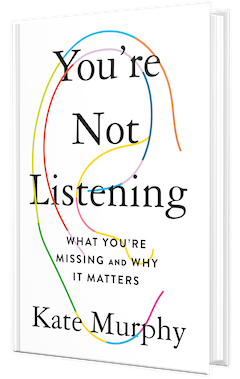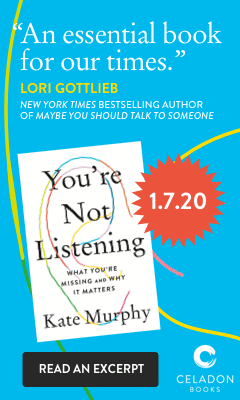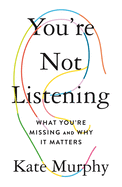You're Not Listening: What You're Missing and Why It Matters
by Kate Murphy
In her fascinating book, You're Not Listening: What You're Missing and Why it Matters, longtime New York Times contributor Kate Murphy explains that these days, we are hyper-communicative: we post, we tweet, we update, we lean in. What we don't do very often, she contends, is actually listen to each other. We simply craft our own narratives, joining a cacophonous sea of voices sans audiences--or at least sans audiences who are paying attention. And it's a real problem.
Even when we do listen, it's halfhearted. "Take first introductions," Murphy writes. "We often miss what people are saying--including their names--because we are distracted sizing them up, thinking about how we are coming across and what we are going to say. Not so when you meet a dog, which is why you can more easily remember a dog's name than its owner's." Murphy compiles a compelling argument for reappraising how we cast our attention, to whom we pay it and why.
Bonding with Fido aside, there are many reasons it's important to listen. Perhaps most significant is intimacy and the relationship it invites: listening connects us to one another. Being better listeners, Murphy argues, can help us in myriad facets of our lives--lives that feel increasingly isolated. Ironically, this isolation is happening in the midst of unprecedented connection by way of social media. Murphy notes: "[Teenagers] are spending more time alone; blue in affect, as well as in appearance, thanks to the reflected glow of their devices. Studies indicate the greater the screen time, the greater the unhappiness." This irony is a rich source of reflection for Murphy, who invites readers to reconsider our priorities, how we define success and how we conceive of happiness. How much can we really be connecting if we are all just waiting for our turn to speak, or constantly checking our phones mid-conversation?
Murphy's writing reads conversationally, and her journalistic skills serve her well in her extensive research. For You're Not Listening, she observes focus groups, questions a CIA interrogator/polygrapher and an FBI hostage negotiator, interviews producers from NPR's Fresh Air and gleans wisdom from a former editor of New Yorker cartoons, a New York City hair stylist and a Catholic priest--among many more experts of various stripes. This diversity of sources results in a collage that helps us understand exactly what listening is and why it matters. If you've ever wondered just why Terry Gross's interviews can feel so fresh and meaningful, Murphy's insights may cast a light.
She's quick to find the humor in her subject. In her exploration of our selective listening and addiction to distraction, she traces human motivations and impulses with humor and awe: "A study by a British advertising buyer found that, on average, when people are at home, they switch between devices (phone, tablet, or laptop) twenty-one times per hour, all while the television is on in the background. So if you're still reading this book so many pages in, I'm ecstatic."
She also, delightfully, highlights how miscommunication gets in the way of conveying meaning. The English language is especially ripe with possibilities for misunderstanding, and Murphy has fun with language and linguistics: "The meaning of hard labor, good sex, not far, and spicy food all depends on who's saying it," she writes. "And, of course, euphemisms like monthly visitor, passed away, big-boned, and between opportunities abound, as people are always coming up with alternative and sometimes cryptic ways of saying what they don't want to come out and say."
Empathy is at the core of Murphy's exploration, as the bond that listening elicits is key. "I've been thinking about what you said," is a line Murphy probes, highlighting just why it's so meaningful to anyone who hears it. It's a sentence that conveys "I listened to you and what you said mattered to me." In essence, that's what this book says, and what listening to someone says: you matter to me. This gift of attention, of reception, is perhaps one of our most powerful to give. Murphy's message may not be loud, but it's clear. Let's listen up. --Katie Weed







